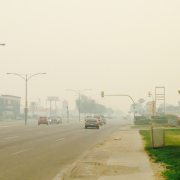Wildfires Impact Lung Health
 Wildfires (including grass fires and forest fires) are an ongoing concern, especially during dry, hot weather. The health effects from wildfire smoke can range from mild to severe and can even be life threatening. When wildfires are in effect we advise everyone to take measures to avoid the smoke as much as possible. Smoke can affect everyone’s health and breathing.
Wildfires (including grass fires and forest fires) are an ongoing concern, especially during dry, hot weather. The health effects from wildfire smoke can range from mild to severe and can even be life threatening. When wildfires are in effect we advise everyone to take measures to avoid the smoke as much as possible. Smoke can affect everyone’s health and breathing.
Some common symptoms from smoke exposure may include:
- irritated eyes
- runny nose
- headaches
- worsening of allergies
Those with Asthma or Chronic Obstructive Pulmonary Disease (COPD), are especially at risk. Worsening Asthma or COPD symptoms that are not managed can lead to an Asthma emergency or a COPD lung attack. A COPD lung attack (COPD flare-up) can be just as deadly as a heart attack. Both a COPD lung attack and an Asthma emergency may result in the need for hospitalization and even death.
Those with Asthma or COPD may experience worsening of symptoms such as:
- shortness of breath
- cough
- wheeze
- chest tightness
- increased mucous production
If Asthma or COPD symptoms worsen, refer to a personalized COPD Action Plan / Asthma Action Plan or call a health care provider. These two diseases are common, but serious. As many as one in five Canadian children have asthma and it is the leading cause of hospital admissions for youth. COPD is the fourth leading cause of death in our country and also results in more hospitalizations than other major chronic diseases such as heart failure, angina, and diabetes. Know the warning signs of an asthma emergency and a COPD lung attack.
Warning Signs of an Asthma Emergency:
|
Warning Signs of a COPD Lung Attack:
|
General recommendations for everyone to avoid forest fire smoke:
- Stay indoors.
- Keep doors, windows and fireplace dampers shut.
- Use air conditioners on the recirculation setting so outside air will not be moved inside.
- Avoid exercising outdoors.
- Take extra precaution with children, who are more susceptible to smoke because they breathe at a faster rate, and their lungs are still developing.
- Children, older adults, and anyone with a heart or lung disease, are more susceptible to smoke. Extra precaution should be taken during wildfire season.
- Keep your windows and vents closed while driving. Again, only use air conditioning in the recirculate setting.
- Do not have campfires or use backyard fire pits. This adds to the poor air quality.
- Make sure your medications are up-to-date and filled. Everyone with Asthma or COPD should have a fast acting (rescue) inhaler with them at all times. Learn how to take your inhaler using the best techniques.
- Pay attention to air quality reports on your local news channel or websites:
Evacuation Areas
If you live in an area that might need to be evacuated due to wildfires, be prepared. Pack an emergency kit which includes prescriptions and medications.
For more information, or if you have questions about lung health, contact The Lung Association of Saskatchewan to speak with one of our Certified Respiratory Educators (CRE).
Monday - Friday 8:30am - 4:30pm @ 1-888-566-LUNG (5864)
- United States Environmental Protection Agency. (July 2, 2008). How smoke from fires can affect your health. https://www.airnow.gov/

